Your cart is currently empty!

7 Reasons Why Social Media Is a Powerful Digital Marketing Channel for Small Businesses
Reading Time: 9 minutesAuthor:
If you’re a long-time reader, you probably know our digital marketing philosophy is based on the hub and spoke analogy. The ‘hub’ is your website, and it’s the job of the ‘spokes’ – channels such as social media and email, as well as tactics like Search Engine Optimization (SEO) – to draw your best customers to it and into your marketing funnel.

Social media is just a single component of digital marketing. However, it wouldn’t be a stretch to say that it’s one of the most important. At the time of this writing, there are over 3.8 billion users across all social media platforms. If you reach even a tiny fraction of them, your business can experience unprecedented growth.
In this article, we’re going to break down precisely what makes social media an essential component in a comprehensive digital marketing strategy. We’ll also look into why it’s perfectly suited for small businesses. Let’s get to it!
7 Reasons Why Social Media Is a Powerful Digital Marketing Channel for Small Businesses
As we mentioned before, social media is far from the only component of a successful digital marketing strategy. If you rely on this channel alone, your business won’t experience as much growth as it could.
Even so, it’s impossible to ignore just how crucial social media is for small businesses. Let’s start by talking about the most pressing reason why that is – money.
1. Social Media Marketing Can Be Relatively Inexpensive
If you manage your business’ social media profiles yourself, then there’s very little to no cost involved in using it to promote your brand. Creating and posting content takes time, but when you compare that to spending hundreds or thousands of dollars on digital ads, the difference is stark.
At most, you might spend some money on social media marketing tools to make your life easier. For example, there are services that provide in-depth analytics into specific social media platforms, others that enable you to schedule content for multiple profiles at once, and more.
However, when you’re just starting out, we recommend that you do the work yourself. That means addressing the following points:
- Figuring out which social media platforms are the most popular among your target audience
- Setting up profiles on all of these platforms, making sure to include your brand elements
- Sharing content from your website as well as original posts that are exclusively for your social media followers
If your website receives a lot of traffic, you can leverage your existing audience by pointing it towards your social media profiles. Once users start to find and follow you on these additional channels, the relationship between your ‘hub’ and ‘spoke’ should become more symmetrical.
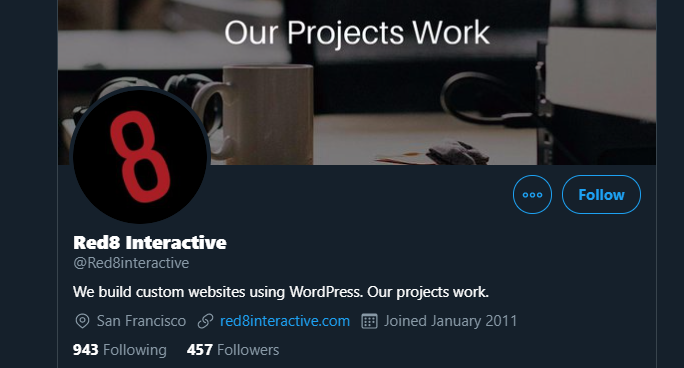
Keep in mind that growing a social media following requires commitment. How often you should post varies depending on the platform(s) you’re using, but for new profiles, you want to be aggressive until you find your footing.
While there are benefits like the lower cost of doing it yourself, especially in the beginning, it also lets you better understand the medium. But if you want help, contact us, and we can give you some options.
2. You Can Build Brand Recognition
Social media is a routine part of many people’s lives. The average user spends almost two and a half hours browsing their feeds every day, providing many opportunities for them to encounter your content and start to become more familiar with your brand.
However, it’s also worth noting that it’s easy to get lost in the noise of social media. Most visitors to your website are actively searching for information, while your followers may be more passive when scrolling through their feeds.
To combat this, it’s important to engage with users as much as possible and post content that appeals to their interests. Developing a strong brand personality can help your posts stand out and get users to stop scrolling and actually read what you’ve published.
A lot of the brands that are famous for their social media marketing were also household names long before Facebook, Instagram, and Twitter even existed. However, social media is a great equalizer. If you’re funny or snarky, for example, your small business can amass a following that competes with giants in your industry.
If you’re smart, you can even leverage the audiences of big brands by engaging with them, which helps promote your own profile:
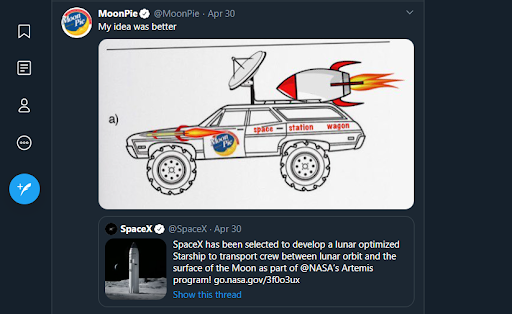
That said, posting interesting content is only half of the equation for a successful social media marketing strategy. You also want to interact as much as possible with other users and develop a unique voice that followers will associate with your brand.
3. SM Can Help You Gain Visibility in Search Engines
There’s an ongoing debate about the impact of social media on SEO. Although Google says that social media doesn’t impact rankings, it’s impossible to deny that having a presence on platforms such as Facebook can help you attract the notice of search engines.
Imagine someone’s looking up your business on Google and the first result that comes up is your website. That’s ideal, but users never see only one result. Chances are some of your competitors will also appear among those top results and steal some organic traffic from you.
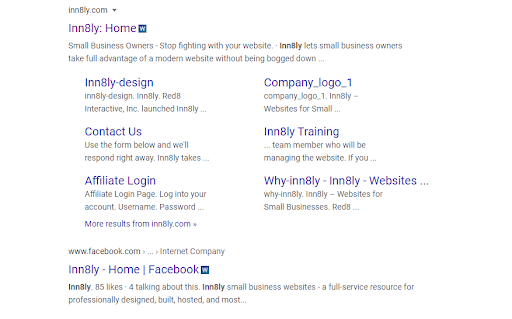
If you have a social media presence, your profiles will probably also rank among the top results for any branded searches:
This can draw more attention to your brand and decrease the likelihood of lost conversions.
If you happen to have a YouTube channel, it’s also worth noting that your videos can appear on Search Engine Results Pages (SERPs). That can be a huge boost for your business if your video content ranks highly for popular search terms.
4. You Can Leverage it to Build Domain Authority
Backlinks are one of the most important signals when it comes to domain authority. Social media provides you with one of the best channels to get more backlinks to your business’ website.
It’s fairly common for users to share links to useful websites or content that they like on social media. Each of these is a new backlink for your site, which tells search engines such as Google that people think your content is relevant and valuable:

It’s also important to know that there are platforms outside of Facebook and Twitter that can help you in this area. Take Quora, for example. It’s a question-and-answer platform where users post forum-style responses to each others’ queries:

If you take a peek into any popular question on Quora, you’ll notice that a lot of people share links in their responses. That’s because, for many questions, there’s amazing content on the web that already provides a definitive or helpful answer.
If your business shares content that provides solutions for your audience, building backlinks and domain authority is only a matter of time. Social media provides you with an additional channel to achieve these goals. You can help the process along by including social sharing buttons on your website, especially for your blog posts.
5. Social Media Provides You With Additional Conversion Opportunities
Digital marketing is all about providing your business with additional conversion opportunities. You can achieve that either through direct offers or by using each channel (or spoke) to bring users to your hub where they can make purchases, subscribe, or otherwise carry out key actions that help your business grow.
Social media is an amazing tool to increase conversion opportunities. If you’re running a sale or a giveaway, for example, social media is the first place you should go to let your audience know about it:
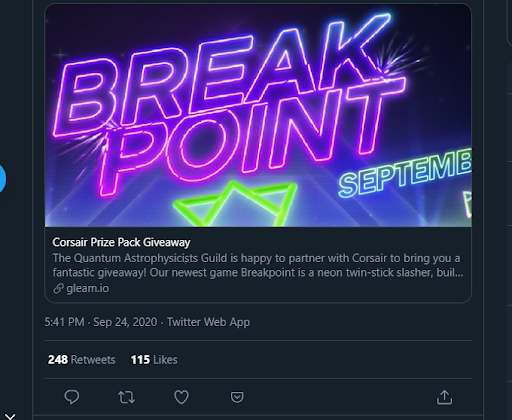
Most users check their favorite platforms multiple times per day, so there are many opportunities for your promotional content to be seen. As we mentioned earlier, studies show that on average, we spend over two hours on social media each day.
More importantly, if an offer doesn’t go over well on social media, you can always modify its format or try something new without waiting too long. By comparison, with email marketing, your subscribers might not like it if you spam them with offers. They’re usually much more forgiving on social media.
6. You Can Use Social Media to Engage With Your Customers
One of the biggest challenges of running a small business is connecting with your customers. If you run a physical store, customers come in, buy what they need, and leave. That doesn’t necessarily give you a lot of opportunities to develop a rapport, which is essential if you want them to keep coming back.
Fortunately, social media is another matter entirely. Once someone follows one of your profiles, you can nurture that relationship using different methods, such as:
- Replying to comments that users leave on your content
- Publishing content that encourages followers to interact with each other and you
- Using private messaging to answer support queries or questions about your products and services
In many ways, social media works as a public forum for your business. Customers (or potential ones) can follow you on their favorite platforms and get an idea of what your business is all about.
That gives you the perfect opportunity to build new relationships that lead to more conversions. If those users are already customers, then nurturing those relationships increases the chances that they’ll return to you when they’re in need of something you can provide.
7. Social Media Provides You With In-Depth Customer Insights
One of the reasons why businesses love social media so much is because it’s capable of providing amazing insights into your customers and overall audience. This information can help you refine your marketing and product development strategies to improve your Return On Investment (ROI).
As your business’ social media presence grows, you’ll get to experience dozens of unique interactions. Followers will ask questions, react to your content, provide their own takes on topics related to your industry, engage with each other, make support requests, and more.
All those interactions provide you with insights into what your audience expects from you. That, in turn, lets you know what content to publish and how to optimize your business’ products and services to better fit their needs.
On top of that, most social media platforms provide in-depth analytics for business accounts. There are countless tools that you can use to dig even deeper into that data, too. Instagram Insights, for example, let’s you know where your followers are located and when they’re most active:
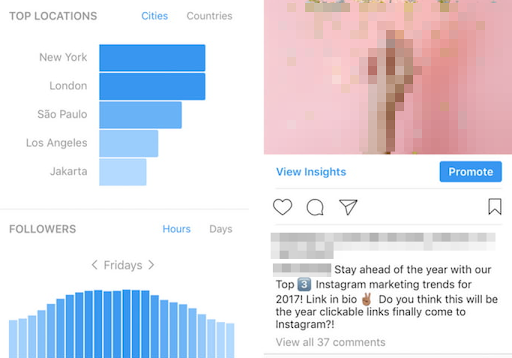
All that information comes in handy when you’re thinking up new content that you can publish on social media. The more your audience grows, the more valuable this data becomes.
Speaking of audiences, all the activity you generate on your Facebook and Instagram pages, and the traffic back to your website feed the Facebook pixel. The pixel can use this activity to build custom audiences, an integral part of an effective marketing funnel, especially mid-funnel tactics. The result is more efficient advertising.
How to Create Your Social Media Posting Strategy
One mistake that a lot of small businesses make is that their social media accounts are all about promotions and sales pitches. If that’s all you’re contributing to followers’ feeds, you’re not going to keep very many of them. Those who do stick around will probably get used to ignoring your content.
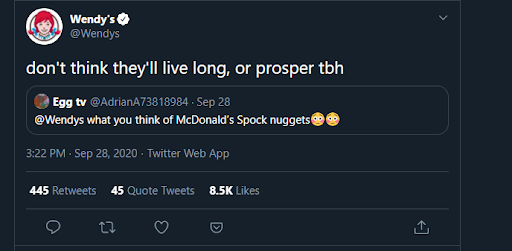
To succeed in social media marketing, you need to provide value and/or entertainment. If you look at some of the most popular brands on Twitter, for example, you’ll notice that many of them are surprisingly witty (which is not what you’d expect from Wendy’s, for example):
You can use social media for promotional purposes, but your content ratio should skew heavily towards value and entertainment. We recommend following the 70/20/10 rule:
- 70 percent of your content should focus on creating value and nurturing your audience.
- 20 percent should focus on content curation, which means sharing valuable posts from other social media users.
- 10 percent of your content can focus on promotions.
Although 10 percent might seem like a low number, it’s still a big slice of your social media presence, particularly if you post every day. By focusing on providing value, you increase the chances that your audience will want to hear or read what you have to say. Then, when you do make them an offer, they’ll be more inclined to say yes.
Why Social Media Makes Sense for Small Businesses – Conclusion
If you want your business to succeed online, you need a comprehensive digital marketing strategy. A key part of it should be social media, as there are essential benefits it provides that other channels may not.
To grow your presence on social media, you’ll need to know which platforms to focus on and ensure you provide your followers with truly valuable, funny, and interesting content. If you can hit one or all three of those notes, your business will flourish on any social media network you use.
Do you have any questions about how to use social media as part of your digital marketing strategy? Follow us on Social Media: Facebook, Instagram, or Twitter. Let’s talk.
Related Posts
Author: James Hipkin
Since 2010, James Hipkin has built his clients’ businesses with digital marketing. Today, James is passionate about websites and helping the rest of us understand online marketing. His customers value his jargon-free, common-sense approach. “James explains the ins and outs of digital marketing in ways that make sense.”
Use this link to book a meeting time with James.

